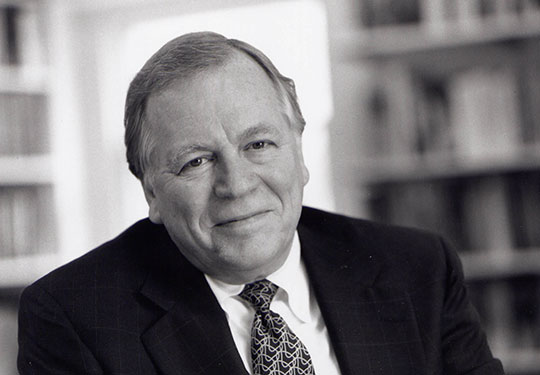Forget about Turnaround Specialists. Can the Boss Learn?
Warner Burke is testing a theory that could finally transform leadership development into a science
Warner Burke is testing a theory that could finally transform leadership development into a science
By JONATHAN SAPERS
WHEN WARNER BURKE TALKS TO GROUPS of executives and managers, he asks everyone in the room to write down what they think are the five most important characteristics of a highly successful leader. Then he bets his audience five dollars that no two lists will be the same and another five dollars that no single characteristic will show up on all the lists.
“I’ve never lost,” says Burke, the Edward Lee Thorndike Professor of Psychology and Education at Teachers College and Chair of TC’s Department of Organization and Leadership.
Burke has been confident of his odds because he knows that while there are many theories of successful leadership, very little substantive research has been done on what an effective leader actually does.
“We just don’t have, in psychology, hard, sufficiently clear evidence of what a successful leader looks like and how he or she behaves,” Burke says. “So the theories are all over the place.”
Companies aren’t doing any better at picking winners. Half of all leaders fail or are fired, yet employers persist in selecting them on the basis of qualities that have no proven connection to success, such as proficiency in the organization’s core skill. For instance, a brilliant researcher might be selected to head R&D regardless of his other qualities. “The correlation between technical expertise and leadership effectiveness is zero, and on that point there is a ton of evidence,” Burke says.
Now, though, Burke believes he has identified the X factor that determines effective leadership: “learning agility,” essentially a person’s ability to adapt to new situations and learn new things. Over the past four years, with the help of Ph.D. students in his Psychology of Management and Leadership Competencies working group, Burke has developed a questionnaire that companies could eventually use to gauge learning agility in promising employees.
Burke began to form his ideas about learning agility early in his own career, which featured, among other things, a stint helping British Airways become a private corporation. “I saw in my consulting work with executives that those who seem to really be the cream of the crop are those who also seem to be able to continue to learn,” Burke says. “And therefore their arrogance score was on the low side. One of the biggest derailers for people in positions of leadership is arrogance.”
Over the years, literature in the field increasingly confirmed that learning agility might indeed play a key role in leadership effectiveness—and in particular that one’s learning approach is important to one’s growth and development. But Burke was unhappy with the measures of learning agility he was able to unearth and so decided to develop what he is calling the Leadership Agility Scale. He and his working group, made up of a changing cast of seasoned doctoral students, spent three years developing 128 questions, which they have since whittled down to 29 and tested on groups of students and others.
Over the past year or so, the group has put the now nearly finished questionnaire through further paces, most recently for what is called “construct validity,” or similarity to tests of related characteristics. For example, Burke’s test was given alongside measurements of five key personality traits by the Center for Creative Leadership in Greensboro, North Carolina, with a particular eye toward results that matched those for the Center’s test for “openness” to new experience. “Our correlation with the CCL data was pretty damn good. So we’re happy as clowns about that,” Burke says.
What’s next? Burke hopes to compare questionnaire results with the grades received by the 60 cadets in the course he teaches on leadership at West Point. The key question: “Will their score on learning agility correlate positively with their final grade in the course?”
After that, Burke hopes to broaden his study to compare survey results for 250 West Point cadets to their academic performance. If the data compare favorably, Burke says he will then be ready to submit his scale and data for publication.
If the Leadership Agility Scale can accurately predict leadership effectiveness, Burke points out, consultants who advise companies on leadership selection could be eager to use it. But Burke, who has authored other seminal tools and texts, including the widely used Burke/Litwin model of organizational change, says he is not interested in making a profit from it. “It’s really for research purposes,” he says. “The whole point is to make it available to anyone who wants to use it.”
Published Thursday, Dec. 15, 2011
